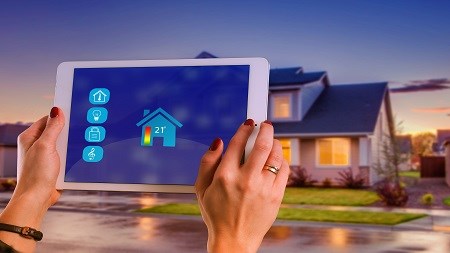In the old days adding value to your home probably entailed redoing the kitchen or adding a TV room. While bricks and mortar are always going to hold their value, there are more modern ways to enhance your investment and make your life easier at the same time.
Essentially, we are talking about the Internet of Things. The Internet of Things means connectivity among all your devices and appliances, including your smart phone. So, for instance, you can use your phone to control your security system, control the interior environment and keep an eye on your property while you are not there. However, in the fast-paced world of technology, this is just the tip of the iceberg. Home automation systems are rapidly coming down in price, they are very easy to use and perhaps the best news - you don't have to be a Bill Gates wannabe to set it up.
Your smartphone can do things that you haven't even thought of like run your bath or alert you if the temperature in your fridge rises. It can get supper started before you get home by turning on the oven, tell you the temperature of your pool before you dive in and even close windows when it starts to rain.
The golden thread running through all of this is information. Your home data has always existed, but wasn't readily accessible and even if it was, required you to be the actual sensor. Technology has made this available remotely and those who take advantage of this are not only improving their own lives, but adding value to their homes, making it an attractive purchase.
The technological tsunami shows no signs of slowing down and achievable home automation goals looming on the horizon include things like: receiving alerts if your electricity or water bills exceed a certain amount and refusing access to unauthorised people if they fail a facial recognition test.
On the entertainment front you can already control devices like a home theatre system, lighting and piped music throughout the home. Things are also looking up for those who plan to utilise the movie and TV streaming services of the likes of Netflix, when it's launched in South Africa. Although streaming has revolutionised home based entertainment, the functionality is reliant on a fast, reliable internet connection. Developers are currently working on an idea that will allow the user to download the required content to the homeowner's automotive system or store the data in a cloud-based 'digital locker' allowing the user to watch the requested program at any time.
The Consumer Electronic Show (CES), a trade show that is held annually at the Las Vegas Convention Center in the U.S. allows manufacturers to exhibit their latest goods and gives a hint at what sort of technological advances have been made. This year's show, which was held in January, served up such delights as self-watering pot plant holders and a toothbrush app aimed at getting children to brush their teeth properly by using connectivity and a 3D sensor that's linked to a game to highlight if the child is brushing effectively.
There is also an interactive mirror on the cards that will take an ordinary mirror and turn it into a smart display that recognises where the cheekbones and eyes are situated on the user's face and offer suggestions as to what sort of makeup would look best in these areas. Not sure how you would look with a moustache? This mirror can digitally enhance your face, reflecting what you will look like with added facial hair.
The CEO of Samsung Electronics, Boo-Keun Yoon, has indicated that 100 percent of its products would be connected to the Internet within five years. To facilitate the smart home process Intel has developed a new chip for the Internet of Things, dubbed Curie, that will be the foundation of even more Internet of Things devices to come.
Maybe a few South African entrepreneurs need to up their game and get in on the Internet of Things action - as things stand no one has invented a robot that can light the fire and braai the meat while the rugby is on.


